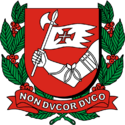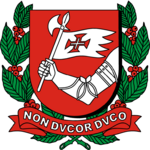List of political parties in Belmonte
 |
|---|
| This article is part of a series on the politics and government of Belmonte |
This article lists the political parties of Belmonte. Belmonte is a democratic state and since the 20th century has a multi-party system, with several political parties from different backgrounds and ideologies influencing the political sphere and the National Congress. After the end of the Great War, many political organizations and associations united themselves and created the two biggest political parties since then: the centre-right National Conservative Union and the centre-left Social Democratic Party. Other major parties are the Citizens' Alliance, the Socialist Bloc and the Sotirian Democrats, which also were capable of having a parliamentary majority and electing some prime ministers in the past.
History
The establishment of the first political parties in Belmonte happens in late 18th century through the creation of the Federalist Party, when the country still was a confederation. Its members were composed by politicians and army officers from urban zones who defended the introduction of federalism and a presidential republic in Belmonte. After their victory in the Federalist Revolt in 1819, some of their members started to become critical of the great amount of powers that the president had and decided to support a parliamentary system of government, thus forming the Liberal Party. With the Belmontese Revolution in 1836, the Federalist Party was dissolved, with its members creating two new parties: the Conservative Party and the Caramuru ones.
The conservative supporter base were most of the middle class and the rural elite, while the Caramarus were mainly composed by members of the armed forces and clerics. Together, the three parties alternated power for the next years until the Great Collapse in 1913. The Liberal Party adopted more left-wing policies and divided itself into the Liberal-Labour Party, the Progressive Republican Party and the Democratic Party, and most of the Caramurus joined the conservatives with the more extremist factions of them forming the National Front, a pro-Gaullican far-right functionalist party, in the 1920s.
After the end of the Great War, the majority of Belmonte was destroyed by the damages of the conflict, and many saw the old parties as too weak and divisive to reconstruct the country and restore order. Due to that, many centre-right parties, including the Conservative Party, united themselves and decided to create the National Conservative Union, with centre-left parties doing the same years later after poor electoral results and creating the Social Democratic Party. The Democratic Party existed as a strong political force until the 80s and was dissolved in the 90s whilst the classical liberal wing of the former Liberal-Labour Party decided to found the Citizens’ Alliance in the 40s. Due to disagreements inside the UCN, the Sotirian Democrats was created years later. After the collapse of the Belmontese Section of the Workers’ International in the 60s, more three left-wing parties were created: the Socialist Bloc, the Social Workers’ Party and the Green Party, which still remains relevant today.
